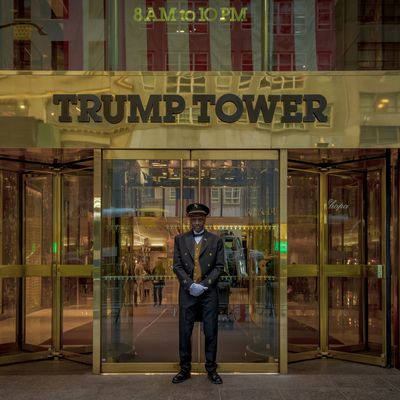
Days before Donald Trump’s business-fraud civil trial in New York was set to begin last month, Justice Arthur Engoron delivered a surprising ruling. He held that Trump and his co-defendants had persistently engaged in fraud by providing false and misleading financial statements to insurers and lenders over the course of roughly a decade. That was surprising enough — a pretrial ruling in favor of the government in a major enforcement action — but then came the kicker: the order to cancel Trump’s business certificates in the state.
On its face, the ruling seemed to spell the end of his business in New York and perhaps even the end of his claim to being a successful businessman, which has proven central to his political appeal. “Donald J. Trump’s sprawling web of businesses in New York faces grave danger and could unravel swiftly after this week’s fraud ruling by a State Supreme Court judge,” as NPR put it in terms that were representative across the mainstream news media. On cable news, anchors and legal commentators alike agreed.
There is reason to question whether Engoron’s decision — however justified it may be in grand karmic terms — will survive the appeals process intact. Indeed, Trump’s lawyers recently obtained a stay of Engoron’s order after an appellate judge hearing an emergency application from the former president’s lawyers expressed uncertainty about the effects of the ruling on Trump’s business operations. The ruling was in fact unclear on some crucial points, but the vague and confusing nature of the order created considerable room for interpretation, which, naturally, was quickly taken to the extreme by some of the usual suspects in the media.
To understand what is going on here, it is helpful to understand a basic legal distinction between the claims brought against Trump by Attorney General Letitia James, on the one hand, and the array of remedies that may be available for those claims, on the other.
The “claims” are the alleged legal violations — in particular, that Trump and his co-defendants engaged in persistent and repeated business fraud and other violations of state law. The potential “remedies” are the array of sanctions that the court has the legal authority to issue if James’s office prevails on some or all of its claims. (In his pretrial opinion, Engoron ruled in favor of James’s team on their stand-alone fraud claim; the remaining claims involve alleged violations of other laws, including, for instance, a state prohibition on issuing false financial statements.)
We all know intuitively, for instance, that even if Trump loses the case, he will not go to prison. That is because imprisonment is not a remedy that is available in the New York attorney general’s case or in any other civil enforcement action. The most salient form of relief in these sorts of cases tends to be money — a financial penalty of some sort.
Beyond that, however, there are often subtle questions about the precise scope of the relief that government plaintiffs can obtain even if they prevail on their claims in a civil setting. In general terms, there are, for instance, a variety of forms of monetary relief (compensatory or punitive damages, for instance, or disgorgement of ill-gotten gains), as well as other types of so-called “injunctive relief,” in which the winning party forces the other side to do something (or to refrain from doing something).
The mere fact that James’s office prevailed on one of its legal claims does not mean that they are entitled to any kind of relief that Engoron might want to impose — monetary, injunctive, or otherwise. As a general matter, depending on the underlying claims and circumstances, there are limits to a court’s authority in this area — constraints that might be a function of the relevant statutory law, earlier court decisions in the area, or even constitutional protections.
In Trump’s case, Justice Engoron’s order purported to cancel “any” business certificate associated with the Trump business entities at issue in the case, as well as any business certificates “controlled or beneficially owned by” Trump and the other individual defendants — even, it seems, if those businesses are wholly unrelated to the fraud at issue. The judge also directed both sides to identify “potential independent receivers to manage the dissolution of the canceled LLCs,” but otherwise provided no meaningful analysis, either as a legal or practical matter, about what was going to happen next.
The topline conclusions certainly sounded bad, but some obvious questions immediately arose: For one thing, should the cancellation of a business certificate automatically lead to “the dissolution” of the underlying business entity? And even if that were the case, what are the appointed receivers supposed to do with the underlying assets held by these entities, which include Trump Tower and 40 Wall Street? Take them over and provide Trump with the stream of any future proceeds? Sell them through some sort of bankruptcy-like process and give Trump the money, perhaps deducting the associated costs? Something else entirely?
At a court hearing the following day, Trump attorney Christopher Kise posed versions of these questions, but even the judge seemed unclear on what he had actually done. Engoron reportedly took a break for “a few minutes” to speak to his principal law clerk before telling the assembled lawyers that he was “not prepared to issue a ruling right now but we will take that up in various contexts, I’m sure.” This was not exactly a confidence-inspiring response, particularly since the judge should easily have been able to identify — if not necessarily answer — these questions himself while he was writing his opinion.
Trump appears to have some other arguments at his disposal as well. For one thing, as the New York–based attorney David Lowden has argued, it is not clear that judicial dissolution of the relevant LLCs is authorized under New York law. There is a state-law provision that gives the attorney general the authority to seek dissolution of “a corporation,” but there does not appear to be an analogous provision in the section of the law that specifically governs limited liability companies.
Trump may also be able to cite a dearth of precedent and questions about the proportionality of the punishment in relation to the underlying conduct. As a legal matter, James’s team did not need to establish that Trump’s counterparties lost any money — or even that they relied on any of Trump’s misrepresentations — but appellate judges may have second thoughts about whether, under those circumstances, forcing Trump’s businesses in the state to immediately shut down is a fair or commensurate outcome, particularly if there would be significant economic harm to innocent third parties. There have been prior cases in which New York courts have canceled business certificates as a result of fraud, but the conduct in those cases appears to have involved identifiable monetary harm to the victims.
At a minimum, Engoron’s order appears to venture into legitimately uncharted terrain. That does not mean that it is necessarily doomed. Engoron may be able to supplement his analysis and shore up his findings after he hears more evidence over the course of the trial. (Indeed, one mystery here is why Engoron simply did not hold off on deciding all of the remedies at once — monetary and injunctive alike — until after the trial was complete.) There is also the distinct possibility that the appellate courts may resolve any open questions under New York law in favor of Engoron, particularly given the unavoidable fact that Trump is a distinctly loathsome figure to many New Yorkers, judges and non-judges alike.
All of this will take some time to unfold — perhaps even a year or more after the trial is over — but in the meantime, it is best to maintain an open mind about the ultimate result, however intense the psychic temptations of Trump-specific schadenfreude may be.
After all, the journalistic subgenre of Trump legal coverage is littered with terrible predictions. Back in the summer of 2021, when prosecutors in the Manhattan DA’s office were contemplating tax-fraud charges against the Trump Organization, there were observers who argued that the mere filing of the charges — before the case had even started, much less ended — would be “almost a death blow” to the company and would “doom” it to bankruptcy. In the end, the company was charged, lost the case, and was ordered to pay a $1.6 million fine. The doomsday scenario did not come to pass.
I am hardly immune from the problem, though having endured too many prophecies of Trump’s imminent legal downfall, I tend toward caution in the other direction. The overriding challenge at this point in Trump’s grand legal saga is that his problems are now so multifaceted and in some respects legitimately unprecedented that predicting how it will all end for the man is like trying to foresee both the trajectory and the fallout of an emerging tropical storm. The outcome could be total devastation, a miraculous miss, or an incursion resulting in moderate to severe damage — a result whose shape we cannot entirely foresee at the moment.
In this case, a healthy dose of skepticism — or at least some patience — is probably your best course. When all is said and done, Trump Tower may remain Trump’s tower.






























